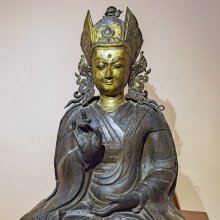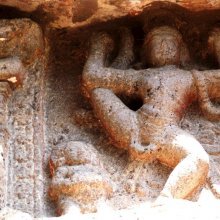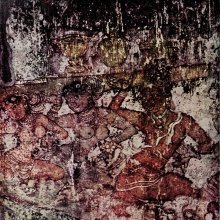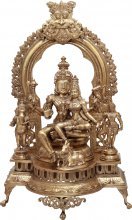Wonder: 5 definitions
Introduction:
Wonder means something in Hinduism, Sanskrit, Jainism, Prakrit. If you want to know the exact meaning, history, etymology or English translation of this term then check out the descriptions on this page. Add your comment or reference to a book if you want to contribute to this summary article.
Images (photo gallery)
In Hinduism
Gitashastra (science of music)
Source: Shodhganga: Elements of Art and Architecture in the Trtiyakhanda of the Visnudharmottarapurana (gita)The Wonder Sentiment (in Sanskrit: adbhuta-rasa) refers to one of the nine kinds of Sentiment (rasa) in Indian classical Music. They have an inherent relationship with the svaras (“musical notes”).—There are nine kinds of sentiments: [e.g., Wonder (adbhuta)]. In the Nāṭyaśāstra some particular svaras are determined for the delineation of some specific sentiments. In the Nāṭyaśāstra it is accepted that—the notes ṣadja and ṛṣabha are used to delineate the sentiments of vīra, raudra and adbhuta.
Gitashastra (गीतशास्त्र, gītaśāstra) refers to the ancient Indian science of Music (gita or samgita), which is traditionally divided in Vocal music, Instrumental music and Dance (under the jurisdiction of music). The different elements and technical terms are explained in a wide range of (often Sanskrit) literature.
Natyashastra (theatrics and dramaturgy)
Source: Shodhganga: Elements of Art and Architecture in the Trtiyakhanda of the Visnudharmottarapurana (natya)The Sentiment of Wonder is denoted by the Sanskrit term Adbhuta-rasa, which represents one of the nine kinds of Rasa (“soul of Drama”), according to the Viṣṇudharmottarapurāṇa, an ancient Sanskrit text which (being encyclopedic in nature) deals with a variety of cultural topics such as arts, architecture, music, grammar and astronomy.—According to the Viṣṇudharmottarapurāṇa, Adbhuta is the sentiment that arises from wonder. Vismaya is the sthāyibhāva of adbhutarasa. Pīta i.e., yellow is the colour and Brahma is the god of this sentiment. The Viṣṇudharmottarapurāṇa states that adbhutarasa arises from vīrarasa. According to the Nāṭyaśāstra, this sentiment is projected through some determinates like the sight of heavenly beings, achievement of unexpected things or fulfillment of desires.

Natyashastra (नाट्यशास्त्र, nāṭyaśāstra) refers to both the ancient Indian tradition (shastra) of performing arts, (natya—theatrics, drama, dance, music), as well as the name of a Sanskrit work dealing with these subjects. It also teaches the rules for composing Dramatic plays (nataka), construction and performance of Theater, and Poetic works (kavya).
Shilpashastra (iconography)
Source: Shodhganga: Elements of Art and Architecture in the Trtiyakhanda of the Visnudharmottarapurana (shilpa)Wonder refers to one of the Nine Sentiments (citrarasa) in ancient Indian Painting (citra), according to the Viṣṇudharmottarapurāṇa, an ancient Sanskrit text which (being encyclopedic in nature) deals with a variety of cultural topics such as arts, architecture, music, grammar and astronomy.—Painting is a medium of showing the inner feelings and emotions of a painter which can strikes the inherent sentiments of connoisseur’s mind [e.g., the wonder sentiment (adbhuta)]. [...] In the Viṣṇudharmottarapurāṇa it is said that the adbhutarasa is manifested through the picture of submissive face of Tārkṣya which is an epithet of Garuḍa and it generates horripilation.

Shilpashastra (शिल्पशास्त्र, śilpaśāstra) represents the ancient Indian science (shastra) of creative arts (shilpa) such as sculpture, iconography and painting. Closely related to Vastushastra (architecture), they often share the same literature.
Yoga (school of philosophy)
Source: ORA: Amanaska (king of all yogas): A Critical Edition and Annotated Translation by Jason BirchWonders are denoted by the Sanskrit term Āścarya, according to the Amanaska Yoga treatise dealing with meditation, absorption, yogic powers and liberation.—Accordingly, as Īśvara says to Vāmadeva: “[...] [Now], I shall define the nature of that highest, mind-free absorption which arises for those devoted to constant practice. [...] By means of an absorption for five [days and] nights, the faculty of hearing from afar, which causes great wonder (mahat-āścarya), certainly arises for the [Yogin]. [...]”.

Yoga is originally considered a branch of Hindu philosophy (astika), but both ancient and modern Yoga combine the physical, mental and spiritual. Yoga teaches various physical techniques also known as āsanas (postures), used for various purposes (eg., meditation, contemplation, relaxation).
In Jainism
General definition (in Jainism)
Source: ORA: Amanaska (king of all yogas): (Jainism)Wonder (in the mind) is denoted by the Sanskrit term Camatkāriṇī, according to the 12th century Yogaśāstra (verse 12.55) by Hemacandra: a Jain treatise dealing with Yoga and the highest reality (tattva).—Accordingly, “[This] Upaniṣad of Yoga, which is a cause of wonder (camatkāriṇī) in the mind of the assembly of the wise, was known from scripture, from the mouth of a good Guru and a little from experience in various places. Because of the profuse requesting of the Caulukya king, Kumārapāla, it was placed in the realm of words by his teacher, the honourable Hemacandra. [...]”.

Jainism is an Indian religion of Dharma whose doctrine revolves around harmlessness (ahimsa) towards every living being. The two major branches (Digambara and Svetambara) of Jainism stimulate self-control (or, shramana, ‘self-reliance’) and spiritual development through a path of peace for the soul to progess to the ultimate goal.
See also (Relevant definitions)
Starts with: Wonder bulb, Wonder flower, Wonder herb, Wonder honey plant, Wonder of the world, Wonder plant, Wonder tree, Wonder-apple, Wonderboom, Wonderboom fig, Wonderboomvy, Wonderplant, Wondrous.
Ends with: Great wonder, Tri-leaf wonder.
Full-text (+801): Vismaya, Adbhuta, Ashcarya, Camatkara, Smaya, Vikshya, Acamba, Camatkarana, Vismiti, Vismayakula, Citra, Vismita, Navalai, Navalapari, Aghatitavindana, Kautuhala, Karasaja, Kamala, Paribbajati, Adbhutopama.
Relevant text
Search found 292 books and stories containing Wonder; (plurals include: Wonders). You can also click to the full overview containing English textual excerpts. Below are direct links for the most relevant articles:
Harivamsha Purana (by Manmatha Nath Dutt)
Chapter 111 - Narada Puts Questions: and the Mystery Is Explained < [Book 2 - Vishnu Parva]
Chapter 131 - Aniruddha’s Wedding and Reception < [Book 2 - Vishnu Parva]
Chapter 6 - Superhuman Deeds of Krishna. He Upsets a carriage and Kills Putana < [Book 2 - Vishnu Parva]
Tiruvaymoli (Thiruvaimozhi): English translation (by S. Satyamurthi Ayyangar)
Introduction to Section 7.8 < [Section 8 - Eighth Tiruvaymoli (Maya! Vamanane!)]
Pasuram 8.5.10 < [Section 5 - Fifth Tiruvaymoli (Mayak kutta)]
Pasuram 3.1.11 < [Section 1 - First Tiruvaymoli (Mutic coti)]
Trishashti Shalaka Purusha Caritra (by Helen M. Johnson)
Part 16: The ten wonders < [Chapter VIII - Initiation of ṛṣabhadatta and devānandā]
Preface to volume 2 < [Prefaces]
Part 7: Visit to Aṣṭāpada < [Chapter V - Life and death of the sons of Sagara]
Parables of Rama (by Swami Rama Tirtha)
Story 136 - Suspending Life-Functions < [Chapter XXI - Spiritual Powers]
Story 115 - God-head, Our Birth Right < [Chapter XVI - Self Realization]
Story 82 - How to Acquire All Knowledge < [Chapter XI - Mind]
Folklore of the Santal Parganas
Chapter CXXXIII - The Brahman’s Powers < [Part III]
Chapter CXLI - Enigmas < [Part III]
Jnaneshwari (Bhavartha Dipika) (by Ramchandra Keshav Bhagwat)
Verse 11.11 < [Chapter 11 - Vishvarupa-darshana-yoga]
Verse 11.6 < [Chapter 11 - Vishvarupa-darshana-yoga]
Verse 18.76 < [Chapter 18 - Moksha-sannyasa-yoga]
Related products
(+54 more products available)










